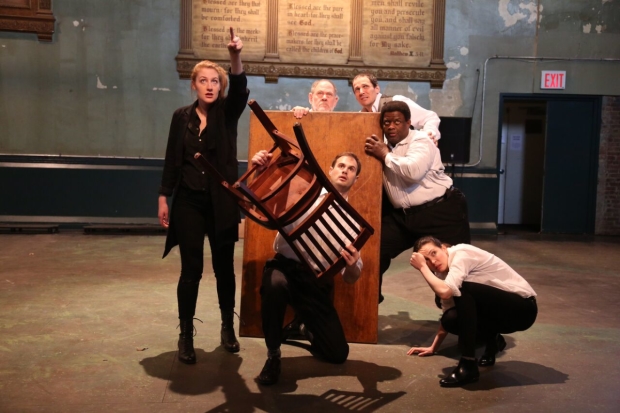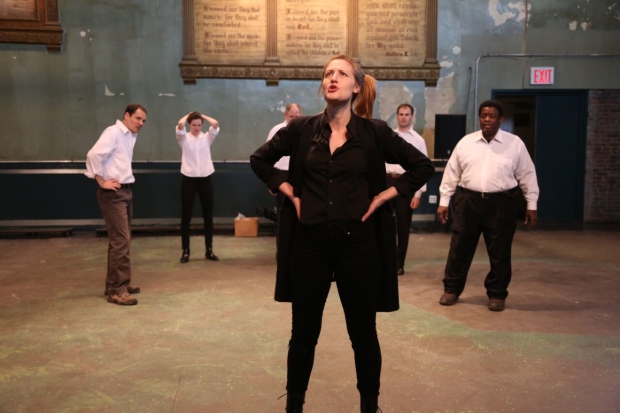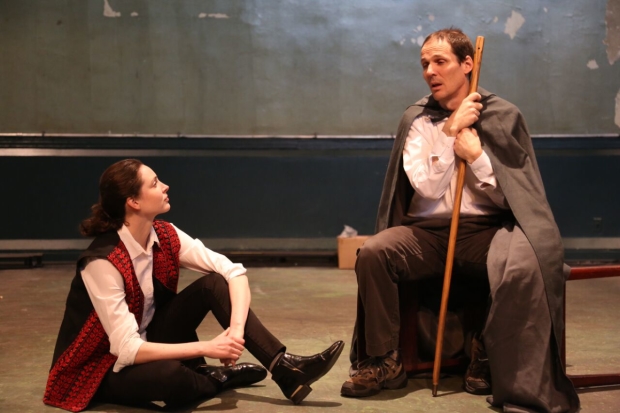1599

(© Gerry Goodstein)
The 400th anniversary of William Shakespeare's death has prompted a host of ambitious productions of his work, particularly in Brooklyn. Unto the breach left by the Royal Shakespeare Company's 12-hour Great Cycle of Kings leaps the Irondale Ensemble, a scrappy band of Brooklynites (not all of them brothers). The company's 1599 highlights a prolific chapter in Shakespeare's life by presenting condensed versions of the four plays he wrote that year: Henry V, Julius Caesar, As You Like It, and Hamlet.
While this is impressive enough, it is even more remarkable that the company performs these four plays (each an epic in its own right) with only six actors. Director Jim Niesen has applied some very smart cuts to the texts to shave them down to about an hour a piece (full productions of Shakespeare average three hours). The result is four and a half hours of great performances from some of the best plays in the Bard's repertoire. Think of it as Shakespeare's Digest.
Niesen was inspired to mount the shows simultaneously by James Shapiro's history, A Year in the Life of William Shakespeare: 1599. That book juxtaposes Shakespeare’s writings from that year with the political and social events rocking Elizabethan England. Shakespeare's work is often described as "timeless," but Shapiro makes a good case for him as an author acutely aware of current events.

(© Gerry Goodstein)
That is certainly apparent in Henry V, the first show of the evening. Sam Metzger plays a petulant and entitled Dauphin of France opposite Alex Spieth's Henry. Wearing lady executive casual, she embodies the warrior King of England in a performance that is decisive and inspiring, resonating not only with Shakespeare's famous queen, but the possibility of the first woman president of the United States of America.
The second offering of the night, Julius Caesar, takes us into the gallery of the Irondale Center (Nielsen makes good use of every inch of the theater, which resembles a crumbling Westminster Abbey), where the actors walk among us. This immersive staging allows for intimate, conspiratorial scenes between Michael-David Gordon's nervous Brutus and the shadowy Roman oligarchy. At the same time, it allows Joey Collins to send his voice booming across the hall during his eulogy to the titular general-turned-dictator. Katie Wieland plays a commanding Caesar, the kind of woman with the power to change the game, perhaps not for the better.
We contemplate Caesar's historical significance as we munch on his namesake salad during a picnic break in the Forest of Arden. Scenic designer Ken Rothchild creates this whimsical space on a shoestring using just sheer curtains and throw pillows. As we chow down, the opening moments of As You Like It take place on the carpet. Katie Wieland's charming Rosalind steals our hearts opposite the hunky Sam Metzger's matinee idol Orlando. This light rom-com of mistaken identity pairs well with dinner, wrapped up by the company's own modern variation on a jig (a dance that often took place at the end of Elizabethan plays, loathed by playwrights yet beloved by the groundlings).
This levity naturally leads us to the walloping finale: Hamlet, which Niesen and Rothchild set in a small box enclosed by hanging cloth, making us feel like Polonius hiding behind the arras. We're not alone, sharing this confined space with a madman: Delivering the most thrilling performance of the evening, Joey Collins is not merely a mopey Prince of Denmark, the royal in black when everybody else is wearing tan (evocative bare-bones costume design by Hilarie Blumenthal). Rather, he is the most violent, erratic, thoroughly dangerous Hamlet I've encountered. Dressed in drag and rapping his verse during the play-within-a-play scene, he engages in a tense standoff with his Uncle Claudius (an appropriately severe and imposing Terry Greiss) that ends with Hamlet chipping his tooth on the microphone. As the usurper King serves us (possibly poisoned) wine during the final close-up fight scene, it is impossible to not feel a rush of adrenaline.

(© Gerry Goodstein)
Seeing all of these plays together, one realizes that Shakespeare wrote "To be or not to be," "All the world's a stage," "Friends, romans, countrymen," and the St. Crispin's Day speech within the span of one incredible year. Even more intriguing are the circumstances that might have driven him to this furious output: Did he feel pressured by the opening of the brand new Globe Theatre, in which he owned an eighth share? Was he alarmed by the prospect of an invading Spanish army burning down his investment when it sailed down the Thames (as was rumored that summer)? How was the national anxiety around an aging and childless monarch reflected in his plays?
Shapiro astutely examines those questions in his book, revealing a backstage drama that is ripe for theatricalization. Instead of just performing truncated versions of the plays, Niesen and company should stage the events surrounding their creation, perhaps in a manner similar to Broadway's acclaimed new docu-musical, Shuffle Along. If anyone can do it, it’s the Irondale Ensemble, a fearless company that you should really know about if you don't already.











